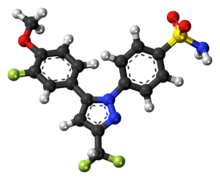Deracoxib
 | |
 | |
| Clinical data | |
|---|---|
| Trade names | Deramaxx |
| AHFS/Drugs.com | International Drug Names |
| Routes of administration | Oral |
| ATCvet code | QM01AH94 (WHO) |
| Legal status | |
| Legal status |
|
| Pharmacokinetic data | |
| Protein binding | High (more than 90%) |
| Metabolism | Hepatic biotransformation |
| Biological half-life | 3 hours at 2–3 mg/kg |
| Excretion | In feces |
| Identifiers | |
| |
| CAS Number |
169590-41-4 |
| PubChem (CID) | 3058754 |
| ChemSpider |
2319853 |
| UNII |
VX29JB5XWV |
| ChEBI |
CHEBI:73032 |
| ChEMBL |
CHEMBL28636 |
| ECHA InfoCard | 100.234.875 |
| Chemical and physical data | |
| Formula | C17H14F3N3O3S |
| Molar mass | 397.38 g/mol |
| 3D model (Jmol) | Interactive image |
| |
| |
| | |
Deracoxib (trade name Deramaxx, Novartis) is a non-steroidal anti-inflammatory drug of the coxib class, used in veterinary medicine to treat osteoarthritis in dogs. It is sold in tablets, which have added beefy flavor to increase palatability. Deramaxx received FDA approval in August 2002 for "the control of post operative pain and inflammation associated with orthopedic surgery in dogs."
Indications and use
Deracoxib is commonly indicated for the control of pain and inflammation associated with osteoarthritis in dogs. It is not approved or recommended for use of pain control in cats.
Dosage
Postoperative pain relief:
3 to 4 mg/kg/day as needed, not to exceed 7 days. This varies by weight.
Osteroarthitis pain relief:
1 to 2 mg/kg/day adjusted to minimum effective dose that has good clinical results
This could mean anywhere from 1/4 of a pill every other day to 1 pill every day.
High doses can cause Cox-1 inhibition even though this drug is selective to Cox-2, which in turn can cause the side effects associated with NSAIDs.
Contraindications
Use of deracoxib should be avoided or administered with extreme caution in dogs who are hypersensitive to deracoxib or other NSAIDs and dogs with gastro-intestinal ulcers, renal disease, hepatic disorders, hypoproteinemia, dehydration, or cardiac disease.
Dogs with renal disease may need dose adjustment (if the benefits of the medication outweigh the risks), while those on concurrent diuretic therapy are at increased risk for NSAID toxicity and should not be given this medication.
Concurrent use with steroids or other NSAIDs should be avoided.
Safety has not been established in pregnant or nursing dogs, so deracoxib should not be administered to such dogs.
Safety also has not been established in dogs younger than 4 months of age, but young dogs may be given this medication so long as they are monitored closely for adverse side effects.
Dogs weighing less than 6.3 kg (under 15 lbs) should not be given this medication for osteoarthitis pain and inflammation, and those weighing less than 3.1 kg should not be given this medication for post-operative pain relief.
Deracoxib is not approved for use in cats.
Adverse effects
Documented adverse side effects include serious and sometimes fatal organ system damage or failure.[1] As with all NSAIDs, this medication may cause gastric ulcerations, evidenced by diarrhea, vomiting, and other GI problems, particularly during long-term use or in sensitive individuals. The medication should be discontinued immediately if such side effects occur and owners should contact their veterinarian. Such side effects are more likely to occur if this drug is used in combination with other NSAIDs or with steroids; therefore is not recommended to give it with other NSAIDs or steroids.
Other side effects include depression, lethargy, increase in drinking or urination, jaundice, vomiting, bloody or black stools, pale gums, hot spots, increased respiration (fast or heavy breathing), incoordination, and behavior changes.